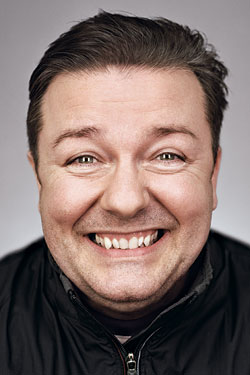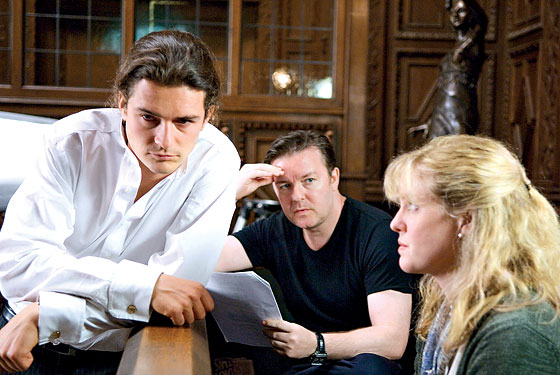
Nobody is likely to confuse Andy Millman with Ricky Gervais. Millman, after all, is a long- suffering extra who bounced around for years between demeaning gigs before becoming the star of an idiotic British sitcom on which he makes funny faces, wears a bad wig, and parrots a pandering catchphrase (Are you ’avin’ a laff?!?!). Gervais, by contrast, is the astoundingly successful British comedian who created and stars in the hit sitcom Extras, on which he plays Andy Millman, the long-suffering, catchphrase-parroting, funny-face-making, wig- wearing hack.
Yet in the waning minutes of the series finale of Extras, which will air December 16 on HBO, Millman, appearing on the reality show Big Brother, and surrounded in this dank level of celebrity hell by a houseful of slutty fame whores and camera-happy retreads, unleashes an excoriating tirade that might cause a Gervais fan to take pause. “Fuck you for watching this at home,” he acidly declares. “Shame on you. And shame on me. I’m the worst of all. Because I’m one of these people who goes, ‘I’m an entertainer. It’s in my blood.’ Yeah, it’s in my blood because a real job’s too hard … You know what a friend of mine said? They said I’ll never be happy because I’ll never be famous enough.” Then he fantasizes about taking off to “somewhere where no one knows me.”
At which point, you might sit up and wonder, Is Ricky Gervais trying to tell us something?
Let’s get one thing straight: When Gervais decries the venality of celebrities, he’s not talking about himself. He’s talking about other celebrities. “There’s these celebrities who’ll do anything to be famous,” he says. “All they’re doing now is being seen getting out of cars. All they’re doing now is being seen with other famous people, trying to be famous by association.” As for himself, he says, “I don’t play those games. I don’t want to water down comedy to get more viewers. I don’t want to rely on catchphrases and funny wigs. I don’t want the BBC to interfere on one word. If they said, ‘Cut that fuck, you’ll get an extra million [viewers],’ I’d put another one in.”
The result of this approach has been successful so far, to say the least. The Office, the series that Gervais wrote with his creative partner, Stephen Merchant, is regarded by comedy fans as an achievement somewhere between As You Like It and Citizen Kane. Extras, his follow-up, has been similarly, if not quite as enthusiastically, lauded. He’s collected a mantel full of Emmys and BAFTA awards. Which makes him, in every sense, the anti–Andy Millman: embraced by critics, beloved by fans, a man who’ll never have to wear a funny wig again, unless it’s to make fun of people who try to make you laugh by wearing funny wigs.
He’s also convinced an astonishing number of those people, the wig-wearers, to skewer themselves on his show, to step up and fall on his comedic sword. On the Extras finale, most of the people in the Big Brother house—the fame whores and the retreads—are real British pseudo- celebrities, playing themselves. “Lionel Blair’s been around forever,” says Gervais. “He’s a cross between Richard Simmons and Fred Astaire. Then there’s Chico; he came in fourth or something in The X Factor, a pop-idol-type thing in England. He’s our Sanjaya.” They’re more than happy to sign on for self-ridicule, if only to prove that they’re in on the joke. Yet it’s weird and slightly uncomfortable to watch them sit by and smile as Millman rants at the empty desperation of their lives, as though they’re the primary exhibits in a court case against themselves.
Of course, Gervais and Merchant have long since established themselves as the maestros of exactly this kind of discomfort. The Office was largely about the bloated delusions and thoughtless cruelties that punctuate everyday life, and Gervais was brilliant as David Brent, the most extravagantly deluded of them all. In Extras, Andy Millman and his best friend, Maggie (played by Ashley Jensen), are both the instigators and the victims of one cartoonish humiliation after another. (In the series finale, Maggie is nearly shit on, literally.) In the second season, though, the comedic humiliations that Millman endured seemed to curdle into something like contempt. Watching Millman’s tribulations as the star of a hackneyed sitcom, cheered on by a braying crowd, I found it hard not to feel that Gervais—the award-hoarding, creative-freedom-wielding superstar—was primarily mocking other actors whose gifts aren’t quite so apparent, whose shows aren’t quite so successful, whose careers haven’t been quite so charmed. So I asked him if he worries about that perception.

“That’s exactly what we’re saying,” he says. “That it’s too easy. It’s not what half of you wanted to do. And you shouldn’t have done it if you didn’t want to do it.” After Extras, Gervais will continue touring his live stand-up show, film an HBO special, and shoot and direct a film he’s written called This Side of the Truth. As for his next collaboration with Merchant, he’s looking toward something more dramatic. “It excites us more. It’s the thing that lasts,” he says. “It’s easy to make people laugh. People laugh at anything. You know what I mean?”
Granted, when you’ve created the greatest comedy in TV history, you might be excused for thinking that this whole comedy thing is pretty easy. “You know when you play tennis with someone who’s nowhere near as good as you,” he says, “and you have to say, ‘Okay, you can play in the doubles area and I’ll only use one arm’? That’s what me and Steve feel like when we’re doing comedy in England. It sounds arrogant. But the first time I won a BAFTA, I thought, Wow, this is amazing. Then they called out someone else who won a BAFTA, and I thought, Well, they’re rubbish. They’re awful. I’m not so proud of this now.”
Okay, what did you expect him to say? I’m just so happy for this opportunity? It’s really great to work with such talented people? Hey, a lot of TV comedy is shite. A lot of celebrities are shameless embarrassments. Gervais is only too happy to point this out, even at the expense of sounding like he’s chastising the world for not being more like Ricky Gervais. He used to be afraid of how people would react to him, but not anymore. “A journalist wrote a piece about me, earlier in the year, saying my stand-up’s awful, Extras wasn’t very good, emperor’s new clothes, and thank God this is the end of his career,” he says. “And that week I got nominated for four Emmys, signed up for two Hollywood movies, and had the fastest-selling live tour in history.” This led to a revelation. “When I first came into this, I was scared of the press. Now, I’m not scared of them. How can they hurt me? Them saying I’m rubbish can’t hurt me. Them not liking me can’t hurt me. Them saying I’m fat and stupid and not funny can’t hurt me.” He’s realized there’s only one person who can really hurt him. He repeats this knowledge like a mantra, and it rings true. “Only I can ruin my career. Only I’ve got that power,” he says. “Only I can ruin this. Only I can ruin it.”